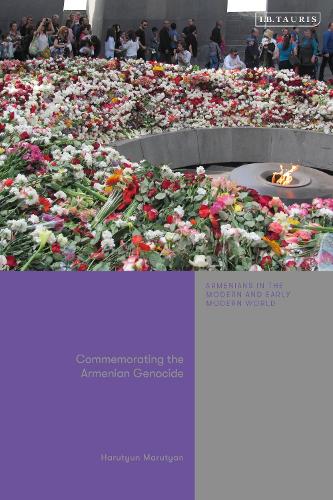
Commemorating the Armenian Genocide
(Hardback)
Publishing Details
Commemorating the Armenian Genocide
By (Author) Harutyun Marutyan
Bloomsbury Publishing PLC
I.B. Tauris
27th November 2025
United Kingdom
Classifications
Professional and Scholarly
Non Fiction
Physical Properties
Hardback
296
Width 156mm, Height 234mm
Description
Commemorated annually on 24 April, Armenian Genocide Remembrance Day is an important part of national identity in both Armenia and the diaspora. This book is a historical and anthropological account of how the genocide is commemorated by Armenians and its evolving significance over time. Beginning with the first demonstrations by survivors in Allied-occupied Constantinople in 1919, to the Stalinist ban on commemoration and the Khrushchev thaw and beyond, the book charts how the politics of the genocide and its official and popular memory fluctuated in Soviet Armenia and the diaspora. The book also provides a detailed account of the rituals involved in the annual march to the Armenian Genocide Memorial in Yerevan and other memory sites, analysing the ways that the collective memory of this foundational event is embodied and continues to reflect and shape Armenian identity today.
Reviews
Memory keeps a nation alive, Even if you cut off its heads, an Armenian poet wrote, the nation is like a hydra that will grow back many more. Anthropologist Harutyun Marutyan gives us a forgotten history of how Armenians around the world, and eventually in Soviet Armenia, remembered their martyrs in the Armenian Genocide of 1915. Commemoration is fundamental to the passing on of memory. Even the young architects who designed the Tsitsernakabert Monument to the Genocide did not know what the Yeghern (Genocide) was when they took up the task. In this beautifully written history, we learn how memory was transmitted for the last one hundred years, a story that has not hitherto been told. Like monuments and commemorations, this book is one of the transmitters that keeps the past alive in the present. * Ronald Grigor Suny, author of "They Can Live in the Desert But Nowhere Else": A History of the Armenian Genocide *
The monograph by the Armenian historian and former director of the Armenian Genocide Museum-Institute, Harutyun Marutyan, traces the changing course of Armenian remembrance culture and history politics with exceptional knowledge and from his own experience. It also explains the special features of Armenian commemorative rituals. Under Soviet rule, the (Eastern) Armenian settlement area that remained after the Ottoman genocide had to fight for decades for the right to self-determined remembrance. It was not until 1965 that Moscow allowed a memorial to be erected in Armenias capital, Yerevan. Since 1967, the impressive memorial has been the second pan-national place of remembrance in Armenia, alongside the Armenian Apostolic Catholicate in Echmiadzin. And it was not until 1988, almost at the end of Soviet rule, that the Soviet Armenian government dared to make April 24 (1915) a national day of remembrance and mourning.
Today, recalling the darkest periods of Modern Armenian history constitutes an essential part of Armenian identity. As a descendant of Western Armenian genocide survivors, the author Harutyun Marutyan played a significant role in shaping this development.
Every group victimized by mass extermination expresses its pain and the trauma endured by the survivors and their descendants. When, moreover, this supreme crime has gone unpunished, as is the case in Turkey, the demand for justice becomes a central element of society. In this respect, Harutyun Marutyan's study offers a comprehensive overview of the various forms of expression in Armenian society, which is still dominated by this legacy. His anthropological approach is masterly and will undoubtedly contribute to further reflection on the consequences of genocide. * Raymond Kvorkian, Director of Research Emeritus, Universit Paris VIII, Saint-Denis, France *
Author Bio
Harutyun Marutyan is Head Researcher of the Department of Cultural Anthropology at the Institute of Archaeology and Ethnography, National Academy of Sciences of Armenia. He is also Chief of Department at the Armenian Genocide Museum-Institute, where he previously served as Director (2018-2023).
